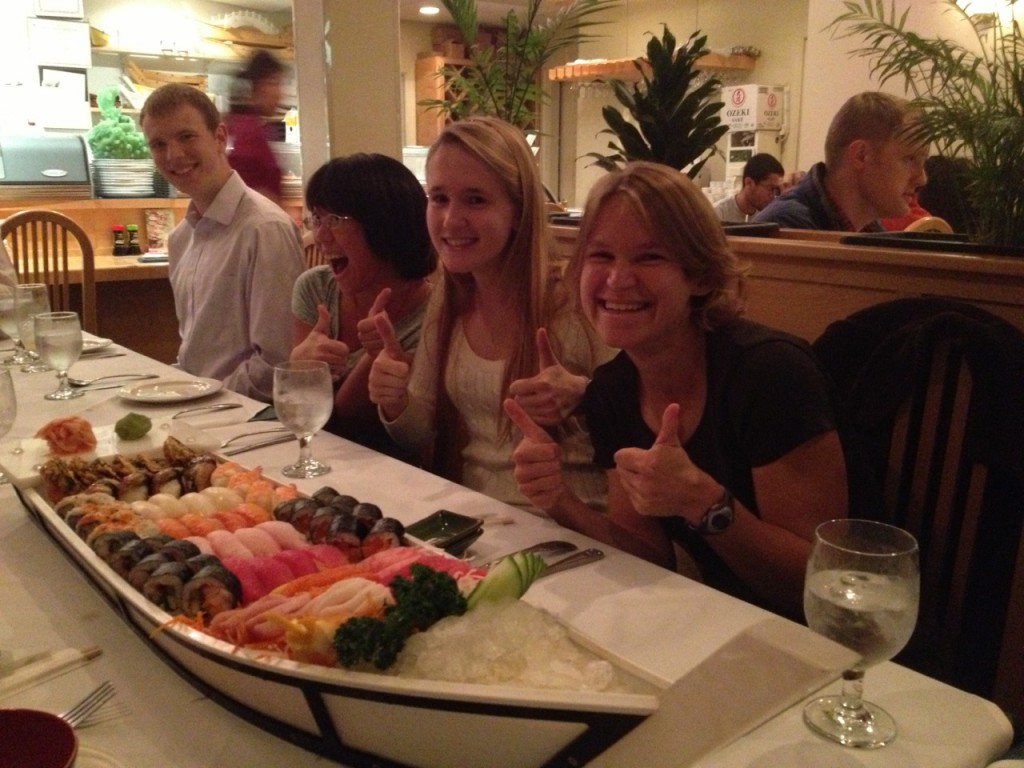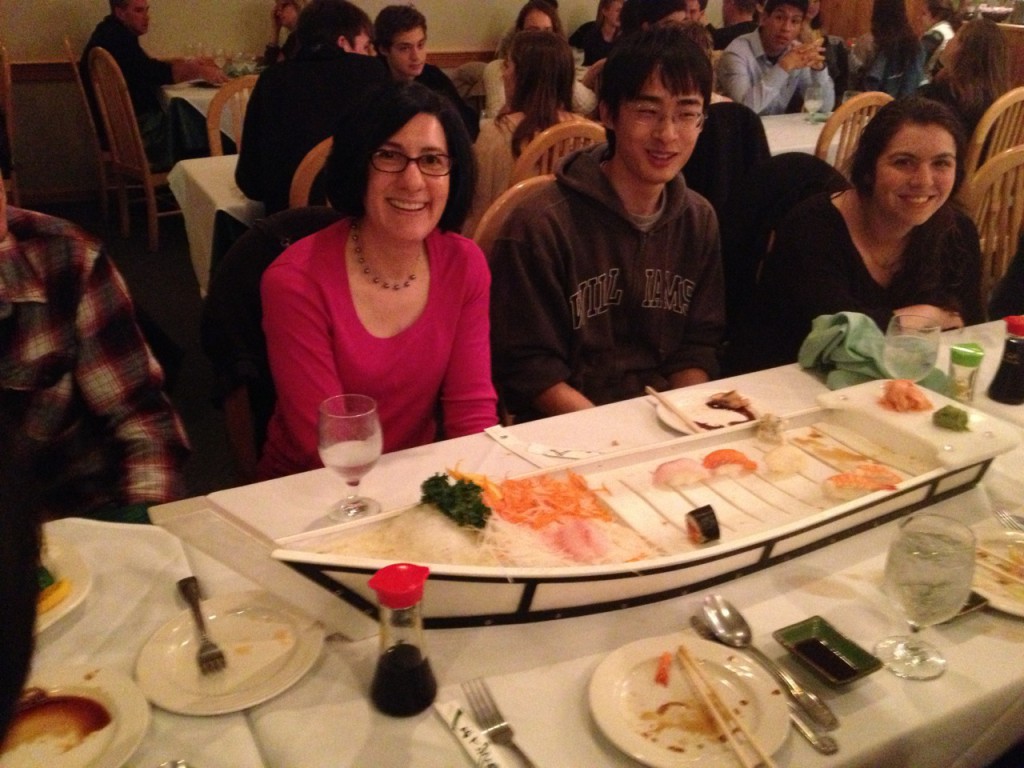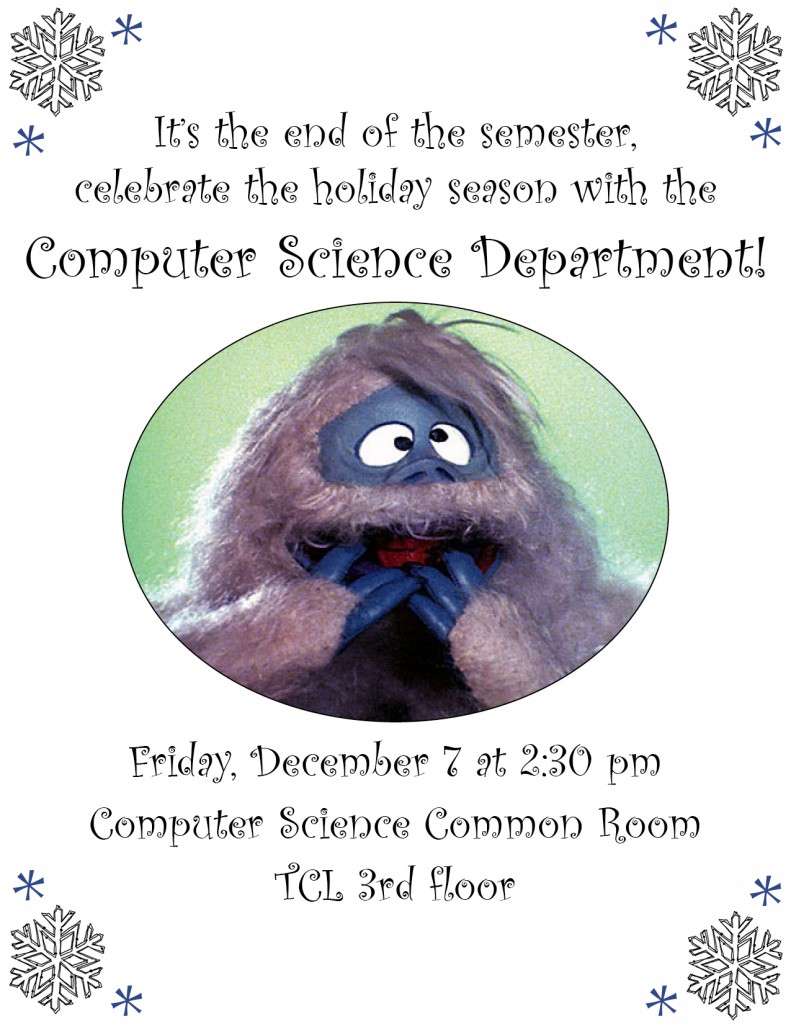News & Events
Jeannie Albrecht – Sigma XI Research Lectures
Jeannie Albrecht, assistant professor of computer science, will present this year’s annual Sigma Xi lectures at Williams College on Thursday, Nov. 15 and Friday, Nov. 16. Free and open to the public, both talks will take place at 4:15 p.m. in Wege Auditorium.
Albrecht will present “Sensor-Driven Energy Management for Smart Buildings” on Thursday. The title of her talk on Friday is “Flattening Peak Electricity Demand in Smart Buildings.”
Albrecht’s research focuses on challenges related to the design and implementation of computer systems, including distributed systems, mobile and wide-area networks, operating systems, and green computing. She was a 2009 recipient of the National Science Foundation CAREER Award for her commitment to research and education.
Sigma Xi is a national society honoring and encouraging research in science. Among the events it sponsors are two lectures given each year by a Williams College faculty member.
Teaching Assistant/Tutor Applications due November 19!

Contact Morgan McGuire if you have general questions about being a TA or specific questions about individual classes.
Class of 1960’s Scholars
The Computer Science Department’s Class of 1960’s Scholars enjoy a sushi boat at Sushi Thai Garden with Professor Lorrie Faith Cranor, featured speaker.

James Wilcox ’13, April Shen ’13, Abbie Zimmerman-Niefield ’15, Brianne Mirecki ’14

Lorrie Faith Cranor, Donny Huang ’13, Lily Riopelle ’14
Computer Science :: Spring Pre-Registration :: Info Session
Public Lecture by Lorrie Faith Cranor “Security, Privacy, and Usability: Better Together”
The Computer Science Department’s Class of 1960 Scholars Lecture
Thursday, October 25 at 8:00 pm in Wege Auditorium (TCL 123)
Security, Privacy, and Usability: Better Together
Usable privacy and security research aims to consider security, privacy, and usability goals together in order to develop solutions in which these goals are not in conflict with each other. In this talk I will highlight some of our projects that illuminate the insights that can be gained through consideration of human behavior together with security and privacy. First, I will discuss our work exploring the usability of tools designed to help users control online behavioral advertising. Our empirical user studies are helping to inform the public policy debate about privacy regulation. Next I will discuss our work on usability and access control. We have explored the access-control needs of non-expert computer users and developed and tested approaches to make access control policy management more natural. We have also explored the ways that underlying access-control system models interact with user interface components and demonstrated that even seemingly small changes to a system’s semantics can fundamentally affect the system’s usability. Finally, I will discuss our research on the usability and security of text passwords. In a series of online studies, we have asked over 34,000 users to create passwords and return to our website several days later and try to recall their passwords. These studies allow us to compare password policies, for example, requiring long passwords or requiring passwords to include uppercase and lowercase letters, digits, and symbols. By examining usability and security properties together, we have identified several common misconceptions about the impact of password composition policies on user behavior. Throughout this talk I will argue that examining security/privacy and usability together is often critical for achieving either.
 Lorrie Faith Cranor is an Associate Professor of Computer Science and of Engineering and Public Policy at Carnegie Mellon University where she is director of the CyLab Usable Privacy and Security Laboratory (CUPS) and co-directs the Privacy Engineering masters program. She is also a co-founder of Wombat Security Technologies, Inc. She has played a key role in building the usable privacy and security research community, having co-edited the seminal book Security and Usability (O’Reilly 2005) and founded the Symposium On Usable Privacy and Security (SOUPS). She also chaired the Platform for Privacy Preferences Project (P3P) Specification Working Group at the W3C and authored the book Web Privacy with P3P (O’Reilly 2002). She has served on a number of boards, including the Electronic Frontier Foundation Board of Directors, and on the editorial boards of several journals. She was previously a researcher at AT&T-Labs Research and taught in the Stern School of Business at New York University.
Lorrie Faith Cranor is an Associate Professor of Computer Science and of Engineering and Public Policy at Carnegie Mellon University where she is director of the CyLab Usable Privacy and Security Laboratory (CUPS) and co-directs the Privacy Engineering masters program. She is also a co-founder of Wombat Security Technologies, Inc. She has played a key role in building the usable privacy and security research community, having co-edited the seminal book Security and Usability (O’Reilly 2005) and founded the Symposium On Usable Privacy and Security (SOUPS). She also chaired the Platform for Privacy Preferences Project (P3P) Specification Working Group at the W3C and authored the book Web Privacy with P3P (O’Reilly 2002). She has served on a number of boards, including the Electronic Frontier Foundation Board of Directors, and on the editorial boards of several journals. She was previously a researcher at AT&T-Labs Research and taught in the Stern School of Business at New York University.
Women in CS attend Grace Hopper Celebration of Women in Computing in Baltimore.
Three students (April Shen ’13, Bryn Reinstadler ’15, and Abbie Zimmermann-Niefield ’15) and two faculty (Jeannie Albrecht and Andrea Danyluk) attended the conference.
Prof. Andrea Danyluk gave a talk on “Undergraduate Research Experience Internships” with Jamika Burge of Information Systems Worldwide. Andrea and Jamika are co-directors of CREU (Collaborative Research Experience for Undergraduates), which is sponsored by CRA-W (the Computing Research Association Committee on the Status of Women in Computing Research) and the CDC (the Coalition to Diversify Computing).
Andrea also took part in a panel entitled “If I’d Only Known”. The panel, intended primarily for junior tenure-track faculty, focused on the panelists’ experiences in successfully navigating the tenure and promotion process.
Bryn Reinstadler ’15 (pictured below) presented a poster on her summer research in bioinformatics at George Mason University.
Stephen Freund – International Conference on Runtime Verification (RV’12)
Stephen Freund will be in Istanbul, Turkey next week presenting a tutorial, “Dynamic Analyses for Data-Race Detection” at the Third International Conference on Runtime Verification (RV’12).
Nick Arnosti ’11 presents paper.
New research on video games presented at ACM SIGGRAPH.
This summer, Associate Professor Morgan McGuire collaborated with colleagues at Vicarious Visions in Albany, NY to develop and present new research on video games in a course at the ACM SIGGRAPH 2012 conference on Computer Graphics and Interactive Techniques.
Creating visual effects that scale with resolution and hardware capabilities is a major challenge in real-time 3D graphics production today. Such effects must run in real-time on older hardware, cost no more than linear time in the screen resolution to support HD displays, and exhibit an increase in visual fidelity on current and future hardware without artist intervention. The last point in particular is a departure from traditional algorithms for visual effects, which tend to run faster yet fail to increase in quality as hardware advances.
In August, Bukowski, Hennessy, McGuire, and Osman shared their approach for developing scalable effect algorithms at SIGGRAPH in Los Angeles, CA. Their course focused on two concrete examples of algorithms for estimating shadowing and camera blur in a new Xbox360 video game. The course notes are online. This work is a continuation of previous publications with Vicarious Visions, Williams undergraduate Michael Mara ’12, and David Luebke at NVIDIA.





